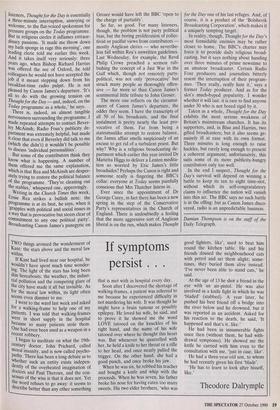If symptoms
persist . . .
TWO things aroused the wonderment of Kant: the stars above and the moral law within.
If Kant had lived near our hospital, he Wouldn't have spent much time wonder- ing. The light of the stars has long been dim hereabouts: the weather, the indust- rial pollution and the competing glare of the city have made it all but invisible. As for the moral law within, its light often seems even dimmer to me.
I went to the ward last week and asked for a walking-frame to help one of my patients. I was told that walking-frames were in short supply in the hospital because so many patients stole them. One had even been used as a weapon in a recent robbery. I began to meditate on what the 19th- century doctor, John Prichard, called moral insanity, and is now called psycho- pathy. There has been a long debate as to whether such an entity exists indepen- dently of the overheated imagination of doctors and Paul Theroux, and the con- sensus of the wise is that it does not. Yet the word refuses to go away: it seems to describe better than any other something that is met with in hospital every day. Soon after I discovered the shortage of walking-frames, a patient was referred to me because he experienced difficulty in not murdering his wife. It was thought he might have a brain tumour or possibly epilepsy. He loved his wife, he said, and to prove it he showed me the word LOVE tatooed on the knuckles of his right hand, and the name of his wife tatooed over where he thought this heart was. But whenever he quarrelled with her, he held a knife to her throat or a rifle to her head, and once nearly pulled the trigger. On the other hand, she had a good punch, and once broke his jaw. When he was six, he robbed his teacher and bought a knife and whip with the proceeds. When he Was seven, his father broke his nose for having eaten too many sweets. His two elder brothers, 'who was good fighters, like', used to beat him round the kitchen table. He and his friends doused the neighbourhood cats with petrol and set them alight; some- times, they buried them alive instead. `I've never been able to stand cats,' he said.
At the age of 13 he shot a friend in the eye with an air-pistol. He was also involved in a knife fight in which he was `bladed' (stabbed). A year later, he pushed his best friend off a bridge into the river below and he drowned, but it was reported as an accident. Asked for his reaction to the death, he said, 'It happened and that's it, like.'
He had been in innumerable fights since then (without them, he had with- drawal symptoms). He showed me the knife he carried with him even to the consultation with me, 'just in case, like'. He had a three-year-old son, to whom he had recently given his first 'blade'.
`He has to learn to look after hisself, like.'
Theodore Dalrymple


































































 Previous page
Previous page